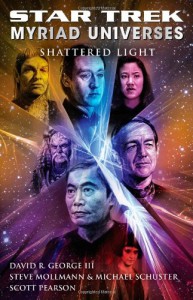
Star Trek: Myriad Universes: Shattered Light: The Embrace of Cold Architects by David R. George III

Be aware, that this review was written in 2011 and only contains comments about the first story, The Embrace of Cold Architects by David R. George III!
~~
So far I only read "The Embrace..." because that was the story I was looking forward to most. And I liked the story - but it clearly suffered from the novella-format. 128 pages just wasn't enough to cover all the aspects of the story, so especially at the end it seemed to jump from one setting to another, leaving huge (and IMO important) time periods in the dark.
I felt Riker's depression was shown realistically, but it was too much in the spotlight compared to Data's development and fight for Lal, especially since Riker's emotional state didn't really change throughout the whole story whereas Data underwent huge changes. I also feel that the emphasis on Riker's depression didn't really have an impact on the story, none of his decisions and actions were really influenced by it, which could have justified its strong depiction.
I absolutely enjoyed the bits and pieces of Data's plotline - at least those that were shown. I felt a bit cheated that once again Data's getting used to human emotions wasn't explored (as it wasn't between GEN and FC). Then I would have wished for a bit more time to get used to Data's decision not to pursue his legal case. It's, of course, totally understandable for his position as a father - but on the other hand, by agreeing to Starfleet's proposal he didn't solve Lal's legal situation, he condemned her to continue her imprisoned existance just for his need of seeing her again. After all, it must have been clear to him that just because he could visit and leave Galor IV, she couldn't do the same. So, on the one hand it's an utterly human decision he makes, on the other hand, given the missing depiction of the development of his "human side", it comes a bit too sudden.
He says to Desjardins that being together essentially was all he hoped to achieve with his legal action, but because he's her father and loves her, he should have made a stand for her legal status once and for all. I didn't feel that the few pages actually dealing with this inner conflict of Data's did it justice, which I think is regrettable because that's ultimately what the story was about for me, the dimension which could have made this an absolutely stunning reading experience.
A few questions/nitpicks that came to me while reading:
* Where's Lore? Why didn't he respond to Soong's homing signal like he did in the series? As he wasn't mentioned at all, did Soong perhaps not build him in this universe (resulting in another change from ours apart from Data's attending the cybernetics-conference later, after "The most toys", which proved to be the focal point)?
* the use of contractions - After the installation of the emotion chip Data once uses a contraction ("I'm sorry", p 63), later on he doesn't and is still surprised at Lal's ability to use them. I guess that wasn't planned?
* Soong's demise - again something that felt a bit underdeveloped/rushed. He's just a plot device to give Data his emotion chip and fix Lal's cascadic failure. But why did he accompany Lal to Galor IV (or rather, why did Starfleet agree to his presence there and drop all charges?), what was his contribution to the mass construction of androids?
I didn't mind the abrupt ending, Desjardins now has the material to pursue his legal cause for android rights, whatever Data's punishment for the destruction of the android production facilities might be, the goal now can only be to settle this matter once and for all. But that's essentially another story which can be told later IMO.
So, I regret the fact that while this is a really good story, it had the potential of being a great one. Perhaps one day, DRG3 is granted the opportunity to expand it and give it the scope the premise deserves.
~~
Maybe I'll pick this book up later and read the other 2 stories as well... who knows?















